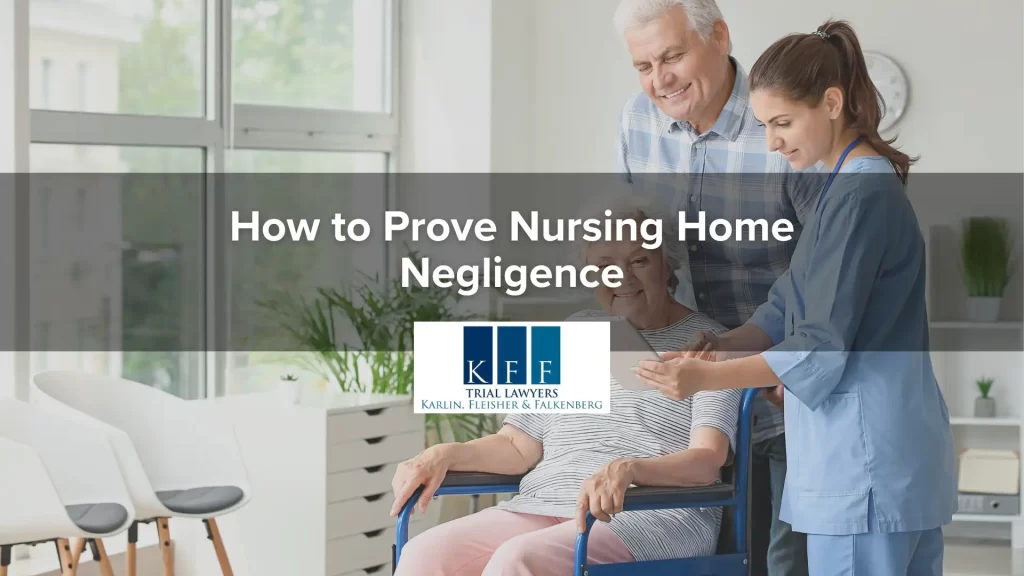
Moving a loved one into a long-term care facility is a major decision. You have the right to expect them to be treated with respect, dignity, and compassion in a nursing home. Discovering that they have suffered abuse and neglect there can be both devastating and infuriating.
But how do you prove nursing home negligence? What steps can family members take to seek justice for their loved ones? Knowing how to recognize nursing home negligence and gather evidence is key to building a strong case. Collaborating with a skilled Chicago nursing home neglect lawyer can provide crucial support and advocacy in your quest for justice for your loved ones.
What Is Nursing Home Negligence?
The first step in combating nursing home abuse or negligence is understanding and recognizing it. This happens when a resident experiences physical, emotional, sexual, or financial harm due to staff or administrators’ actions or neglect.
Many cases of negligence in nursing homes arise from a chronic staff shortage, leading to stressed employees and unethical hiring of unqualified individuals to fill gaps. However, long-term care facilities have a responsibility to staff their establishments appropriately. The failure to do so can make them liable for any resulting harm that comes to their residents.
Common Forms of Nursing Home Negligence
According to the National Center on Elder Abuse, one in ten older Americans suffers harm from negligence each year. This negligence can take many forms, including:
- Failure to provide adequate nutrition or hydration – This includes not assisting residents at mealtimes, providing food that is cold/spoiled, withholding food or water as punishment, and not accommodating special dietary needs. Look for significant weight loss or signs of malnourishment in medical records.
- Neglecting to give necessary medical care – Missing doctor appointments, failing to change wound dressings, not contacting a doctor when a resident’s health declines, and ignoring resident complaints of pain can prove deadly.
- Errors in administering medications – Giving wrong dosages, mixing up residents’ prescriptions, and neglecting to give medications at proper times can cause symptoms to worsen or new conditions to develop.
- Inadequate hygiene provided for residents – Allowing fingernails or hair to become overgrown, not bathing residents regularly, and leaving soiled clothes or bedding unchanged is dehumanizing and unhygienic.
- Lack of cleanliness in facilities – Dirty common rooms, mold or mildew in bathrooms, foul odors, and pest issues can cause diseases.
- Poor management of infectious diseases – Not isolating sick residents, allowing staff with illnesses to come into work, and insufficient handwashing or sanitization practices during outbreaks all put vulnerable residents at risk.
- Unsafe conditions – Not securing rugs or cables, allowing clutter to accumulate in hallways, failing to engage wheelchair brakes, and having slippery floors can lead to trips and falls, causing injury.
- Few or no visits allowed – Excessively restricting or monitoring visits without cause isolates residents from loved ones. It also prevents proper oversight from occurring.
- Abuse – Physical assaults, yelling, insults, rough or forceful handling, emotional abuse through threats or humiliation, and sexual abuse can cause unimaginable bodily and psychological harm to residents.
- Unethical financial handling – Misusing residents’ accounts, overcharging, mishandling pensions, and stealing a resident’s possessions can all deprive residents of resources intended for their care.
Because nursing home residents are inherently vulnerable, consequently, these forms of negligence can cause them irreparable harm. Furthermore, in many instances, the consequences can be fatal.
Key Evidence to Collect
When building a nursing home negligence case, there are several key types of evidence to collect:
- Medical Records – Review them for neglect or abuse indicators, such as untreated bedsores, significant weight loss, fall injuries, or delayed treatments. Also, look for signs of improper administration of medications.
- Staff Testimony – Interview or depose nursing home staff members to understand care policies and daily routines. Question aides about their workload, training, and whether they have witnessed neglect. Their insights can reveal systematic neglect issues.
- Family Observations – Document your own first-hand observations during visits through detailed notes, photos, or videos. For example, note unsanitary conditions, unchanged bedding, or unchanged adult diapers. Observe how the nursing home staff interacts with your loved one.
- Complaints from Others – Collect written or verbal complaints from other residents, families, or staff alleging abuse or neglect issues. Their testimony can help establish a pattern.
- Inspection Records – Request state inspection reports and complaint investigations. Facilities with histories of violations are more likely to have ongoing systemic issues.
Consult an Attorney
 It is critical to consult an experienced nursing home abuse attorney, particularly when building a negligence case. They can conduct professional investigations by interviewing staff and witnesses, requesting records, and hiring experts. Most importantly, attorneys understand the complex regulations nursing homes must follow and can build the strongest legal argument to hold them accountable for noncompliance and abuse. Their experience and skill can maximize your likelihood of success, financial compensation, and justice.
It is critical to consult an experienced nursing home abuse attorney, particularly when building a negligence case. They can conduct professional investigations by interviewing staff and witnesses, requesting records, and hiring experts. Most importantly, attorneys understand the complex regulations nursing homes must follow and can build the strongest legal argument to hold them accountable for noncompliance and abuse. Their experience and skill can maximize your likelihood of success, financial compensation, and justice.
Contact Karlin, Fleisher & Falkenberg, LLC Today
If your loved one has suffered harm from nursing home negligence, you deserve to hold the wrongdoers accountable. Whether you are seeking to prove assault, medical malpractice, or wrongful death, a successful nursing home lawsuit requires a solid collection of evidence.
Working with an experienced Illinois nursing home abuse lawyer at Karlin, Fleisher & Falkenberg, LLC can give you the investigative and legal strength you need at this challenging time. Our legal team of attorneys has fought tirelessly for injured individuals in Chicagoland since 1970, and our track record shows that we have what it takes to stand up for you and your loved ones. Call us today at 312-346-8620 or contact us online for a free case evaluation to learn more about how we can help you.
Related posts:
